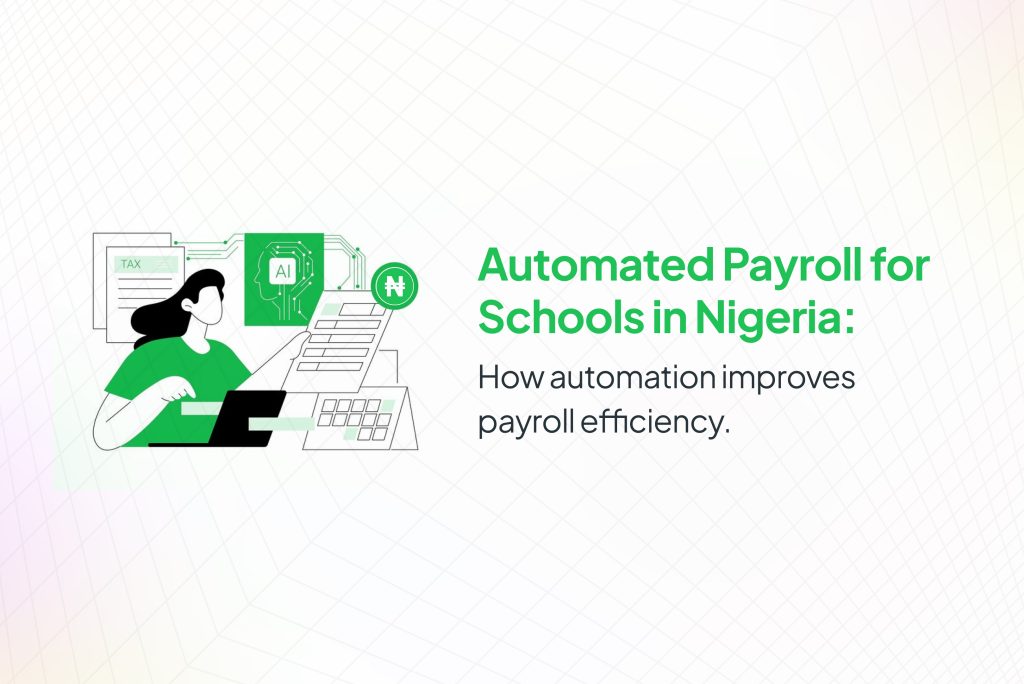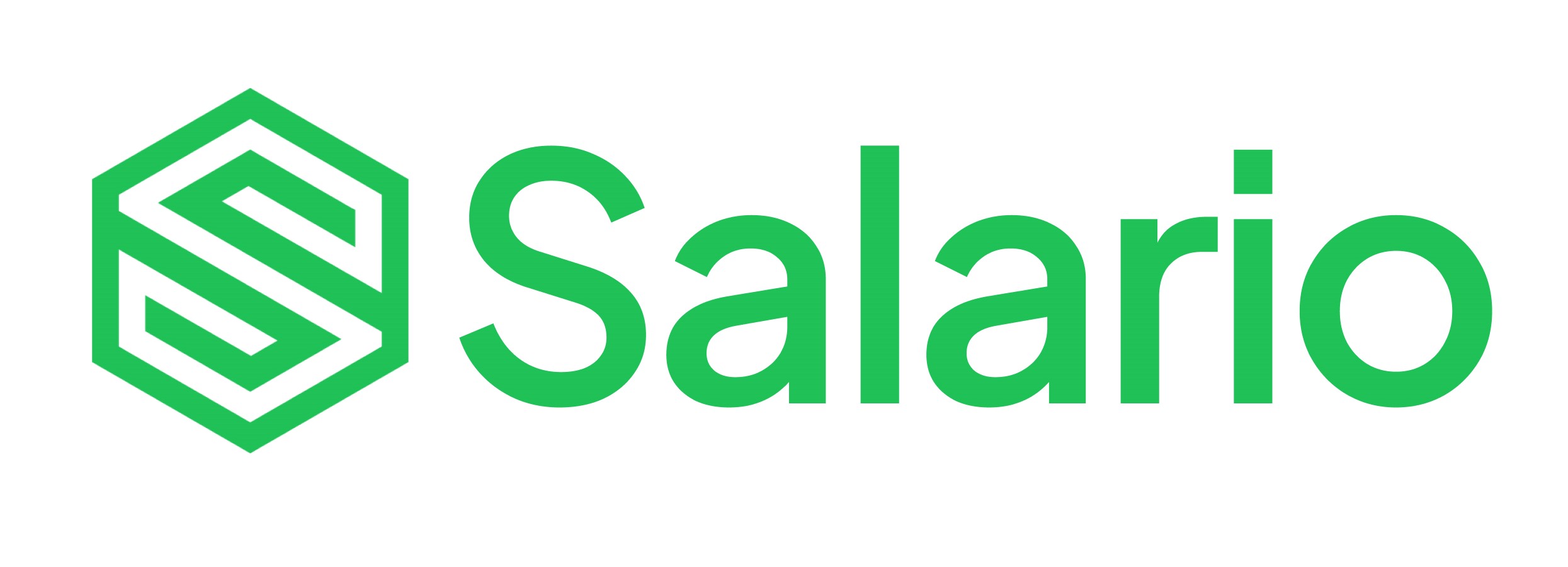
Many Schools in Nigeria are yet to harness the power of automated payroll. Automated payroll for schools in Nigeria vastly increases productivity while reducing errors and risks attached with manual payroll processing.
For school administrators considering payroll automation, this blog post goes indepth into why it should be a top priority for your payroll and allays some of the fears that many school HRs, bursars and administrators have. Dive in to understand how going for an automated payroll system helps your school do more with less.
What is Payroll Automation? (And Why It Matters)
Payroll automation for schools refers to the use of digital tools and software to handle salary payments, tax deductions, employee records, and compliance tasks without relying on manual processes. Instead of calculating staff salaries on spreadsheets or paper, automated payroll software in Nigeria allows schools to run payroll more accurately, efficiently, and with minimal human error.
Traditionally, many schools manage payroll manually. They keep long lists of employee names, calculate salaries manually, print payslips, and visit tax offices for remittances. While this may seem manageable, manual payroll systems are prone to delays, miscalculations, and compliance issues. Simple mistakes like missing a pension deduction or miscalculating PAYE can lead to penalties, staff dissatisfaction, and administrative stress.
With automated payroll software, schools can calculate salaries, apply deductions, generate payslips, and remit taxes, all in just a few clicks. These systems are not as complex or expensive as many assume. In fact, many tools used to automate school payroll are cloud-based, user-friendly, and built with schools in mind.
More importantly, payroll automation helps schools save time, reduce errors, improve transparency, and stay compliant with Nigerian tax laws. Whether you’re a bursar, school accountant, or HR officer, automation empowers you to focus on more strategic tasks instead of wrestling with monthly salary spreadsheets.
By adopting automated payroll for schools in Nigeria, educational institutions can finally replace guesswork and paperwork with speed, accuracy, and peace of mind.
Key Benefits of Payroll Automation for Nigerian Schools
Switching to automated payroll for schools in Nigeria is more than just a tech upgrade, it’s a strategic shift that addresses some of the biggest pain points in school administration. From ensuring timely payments to improving compliance, payroll automation delivers tangible value to schools across the country. Here’s how.
1. Faster Payroll Processing
Manual payroll systems often take hours or even days, especially in larger schools with multiple staff categories. Processing payroll can become an overwhelming task during busy academic periods like resumption, exams, or term closure.
With payroll automation for schools, what used to take hours now takes minutes. Salaries are auto-calculated based on preset parameters like basic pay, allowances, and deductions. This means that payroll officers and bursars can focus on other administrative duties while the system handles the heavy lifting.
2. Fewer Errors and Omissions
Human error is one of the most common issues in manual payroll some common errors include miscalculating salaries, missing deductions, or forgetting to account for sick or leave days. These mistakes not only frustrate staff but can also have legal or financial consequences.
An accurate payroll system powered by automation minimizes these risks. Leave records, overtime, and other variables are auto-applied using predefined logic. This leads to cleaner payroll cycles and less time spent resolving disputes or correcting figures.
3. Better Tax and Pension Compliance

Tax regulations such as PAYE compliance in Nigeria, NHF contributions, and pension deductions are essential for schools. However, keeping track of all the required rates and remittance timelines can be challenging, particularly when done manually.
Automated payroll systems simplify this. They apply the correct statutory deductions and generate remittance-ready reports schools can submit to tax authorities or pension fund administrators. This ensures the school stays compliant and avoids late payment penalties.
4. Staff Trust and Morale
Late or inaccurate salary payments can lead to staff dissatisfaction, low morale, and even high turnover. By automating salary management for school staff, schools can guarantee timely, consistent payments month after month and, in turn, improve employee satisfaction.
Add in employee payslip automation, and staff can access their salary breakdowns digitally—anytime, anywhere. This transparency builds trust and shows professionalism, especially in a sector where many schools still operate without structured payroll systems.
5. Easier Recordkeeping and Audits
Storing payroll data in filing cabinets or local spreadsheets makes audits a nightmare. Schools often scramble to find payroll history or verify compliance documents, whether it’s a board review or a government inspection.
With digital payroll records, every transaction is logged and stored in the cloud. When it’s time for a school payroll audit in Nigeria, everything you need is just a few clicks away, accurate, accessible, and professionally organized.
Common Concerns About Adopting Payroll Automation (And How to Overcome Them)
While many schools acknowledge the value of automated payroll for schools in Nigeria, some remain hesitant due to common misconceptions. These concerns often stem from unfamiliarity rather than the reality of modern payroll tools. Here’s a closer look at those worries—and why they shouldn’t hold your school back.
“It’s too expensive.”
Cost is often the first objection. But in truth, there are many affordable Nigerian payroll automation options tailored for schools of all sizes. More importantly, automated systems often cost less than the cumulative losses from manual payroll errors, late tax filings, or compliance penalties. Over time, automation pays for itself—while improving payroll accuracy and efficiency.
“We don’t have IT staff.”

Another common myth is that payroll automation requires a full IT team. In reality, most school payroll software today is plug-and-play, meaning it requires minimal setup and no coding skills. Many providers also offer local support and training, making onboarding seamless, even for non-technical school administrators.
“What if the system fails?”
Reliability is crucial, and good payroll systems are built with that in mind. Most offer cloud backups, regular data syncing, and even offline functionality to ensure that technical issues don’t interrupt salary processing. With the right provider, schools can enjoy secure, uninterrupted payroll management.
In short, automating payroll doesn’t need to be complex or risky. With the right support and tools, any school can make the transition smoothly, and start reaping the long-term benefits of payroll automation.
How to Choose the Right Payroll Software for Your School
When adopting automated payroll for schools in Nigeria, the real value lies in choosing software that’s designed with local realities in mind. Here are five key features to prioritize when making your selection:
Local support availability:
Working with a provider that offers local onboarding and support can make a huge difference. Whether it’s installation help or resolving a mid-month issue, having responsive, Nigeria-based support ensures your school stays on track.
Nigerian tax compliance built-in:

Your software must automatically handle PAYE, NHF, and pension deductions in line with government regulations. This eliminates the guesswork and keeps your school compliant with less manual input.
Simple dashboard, payslip generation:
Ease of use matters. A clean, intuitive dashboard allows bursars or admin officers to manage payroll effortlessly. Plus, staff should be able to receive or download digital payslips without needing to ask HR repeatedly.
Compatibility with banks and pensions:
Your payroll system should integrate seamlessly with Nigerian banks and pension platforms, enabling smoother transfers, faster remittances, and fewer reconciliation issues.
Option for bulk salary payment:
Schools with multiple staff need bulk payment functionality, allowing all salaries to be processed and disbursed in one go, without uploading files or making transfers manually.
The right software doesn’t just automate, it adapts to your school’s needs and helps you run payroll better.
Conclusion
Automated payroll for schools in Nigeria is no longer a luxury, it’s a necessity for educational institutions aiming to streamline operations, reduce errors, and ensure compliance with local tax laws. By transitioning from manual processes to digital payroll systems, schools can save time, improve accuracy, and foster trust among staff through timely and transparent salary payments. Despite common concerns about cost, complexity, and reliability, modern payroll software is designed to be affordable, user-friendly, and secure, making it accessible to schools of all sizes.
With the right payroll automation tool like Salario, schools can focus on their core mission of providing quality education while leaving the administrative burdens of payroll management to efficient, automated systems.
Interested in trying a payroll solution that improves your school’s payroll productivity and drastically cuts down on your payroll errors and employee dissatisfaction? Book a demo call with us right away.
